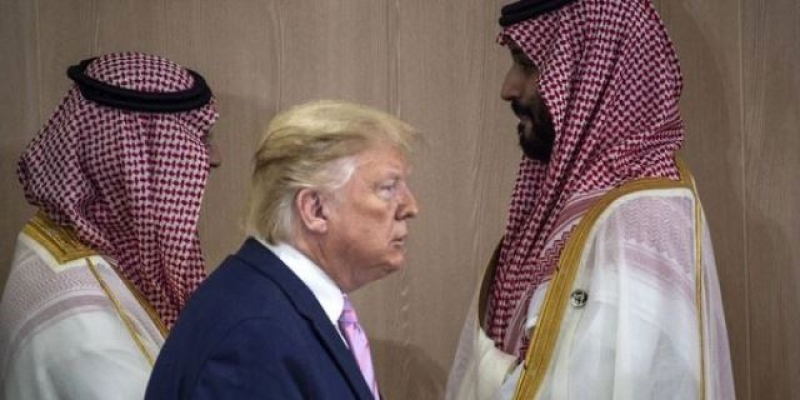- UNRWA Situation Report on Crisis in Gaza & Occupied West Bank |
- Intimidation or bloodshed cannot halt Bangladesh’s march to democracy |
- Khaleda Zia integral to an important chapter in BD history: Yunus |
- Enthusiasm marks Victory Day celebrations across Bangladesh |
- Dhaka-Delhi ties deep; to be shaped by trust, dignity, mutual respect |
US Considering Nuclear Power for Saudi Arabia in Grand Bargain

The Trump team has made latest bid for Saudi-Israel normalization which goes way too far and is considered to be a one-way street
By Ivan Eland
WASHINGTON DC, Apr 23 2025 (IPS) - The Trump administration is reportedly pursuing a deal with Saudi Arabia that would be a pathway to developing a commercial nuclear power industry in the desert kingdom and maybe even lead to the enrichment of uranium on Saudi soil.
U.S. pursuit of this deal should be scrapped because the United States would bear all the increased commitments, costs, and risks with very little in return.
In the Abraham Accords of 2020 and early 2021, the first Trump administration brokered bilateral agreements between Israel and the Middle Eastern countries of Bahrain, United Arab Emirates, Morocco, and Sudan to normalize diplomatic relations. The administration also attempted to get Saudi Arabia to recognize Israel as a sovereign state and open similar relations, to no avail.
The Biden administration carried the torch in this regard but it became even more difficult to get Riyadh on board after the 2023 Hamas attacks on Israel and ensuing war in Gaza. The rising civilian death toll and humanitarian crisis led to an elevation of the Palestinian cause and engendered region-wide animosity toward Israel.
The Saudis demanded at that point that Israel commit to meaningful steps toward the creation of an independent Palestinian state before any normalization would occur.
That continued into this year as the Saudi government denied President Donald Trump’s assertion that it had dropped its demand for a Palestinian state in order to normalize relations with Israel.
Even though efforts aimed at ending the war in Gaza have been unsuccessful, the second Trump administration is seemingly now reviving its efforts toward brokering an Israel-Saudi rapprochement, albeit beginning with a new U.S.-Saudi agreement first, as hinted by U.S. Secretary of Energy Chris Wright.
The problem is that all the countries would benefit from such a grand bargain except the one brokering it — the United States, which would also absorb all of the costs. Israel and Saudi Arabia would gain the most. The Saudis have desperately wanted a nuclear power deal for some time.
Meanwhile, if there is eventual normalization, Israel would neutralize what is now a powerful Arab rival and likely even gain a new ally in its quest to counter Iran (but it had better do it fast as Riyadh and Tehran have been approaching some level of detente for some time now).
Saudi Arabia has also sought formal security guarantees, which were reportedly on the table during the Biden administration. This would supplant the long-standing informal agreement between President Franklin Roosevelt and Saudi King Abdul Aziz Ibn Saud, which provided security for the desert kingdom in exchange for U.S. access to cheap oil supplies.
Yet, with a $37 trillion national debt, why would the United States take on another ward that doesn’t pay its fair share for security (a common Trump gripe about other U.S. allies)? With fracking, the United States is no longer running out of oil, as FDR assumed would be the case, and is again the world’s largest oil producer.
A formal defense pact with Saudi Arabia would incur yet more costs, further entrench the U.S. in the region, and put our own troops in harm’s way if Washington is expected to defend and bail out Riyadh in any military dispute with its neighbors.
In addition, what could go wrong if Saudi Arabia was given a nuclear program? Talks on an Israel-Saudi agreement previously faltered when the Saudis opposed restrictions that would have prevented them from using a commercial nuclear program to build nuclear weapons (to counter any Iranian nuclear capability), or to assist other countries in obtaining them.
The truth is, the Saudis have wanted to be able to enrich uranium — perhaps to bomb-grade levels — on their own soil rather than import uranium already enriched only to a level capable of generating commercial energy, for some time.
Some in the United States insist that the Saudis could get nuclear technology from other nations like Russia or China, but if they resist safeguards to prevent them from getting a weapon, then it wouldn’t matter who gave them the technology that would allow them to do it.
Thus, the Trump administration should desist in reaching any such agreement with the Saudis in its (right now) futile quest for Israel-Saudi grand rapprochement. Normalization of relations between the two countries would be a fine aspiration for the region (if it is not merely to isolate and poke Iran), but the United States meeting the Saudis’ exorbitant demands to achieve it would come at too great a cost.
After all, bilateral normalization should be in the interest of both countries, so they should negotiate it on their own without being coddled by the United States.
Ivan R. Eland is Senior Fellow at the Independent Institute and Director of the Independent Institute’s Center on Peace & Liberty. Previously he was Director of Defense Policy Studies at the Cato Institute, and spent 15 years working for Congress on national security issues. He is the author of several books, the most recent, War and the Rogue Presidency: Restoring the Republic after Congressional Failure.
https://www.independent.org/person/ivan-eland/
Source: Responsible Statecraft
The views expressed by authors on Responsible Statecraft do not necessarily reflect those of the Quincy Institute or its associates.
IPS UN Bureau

